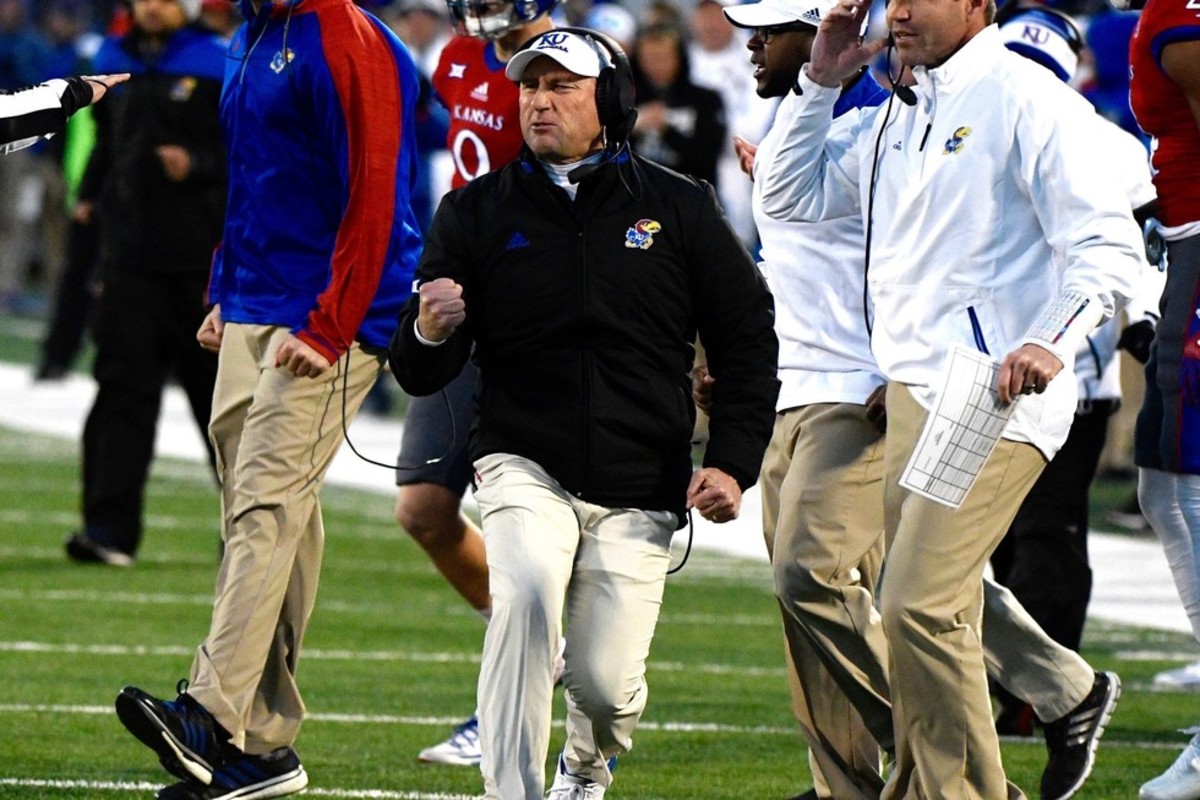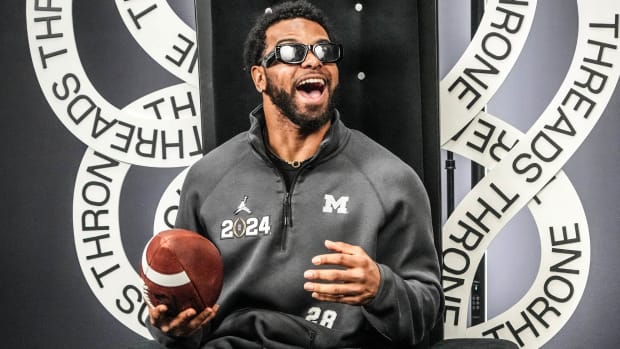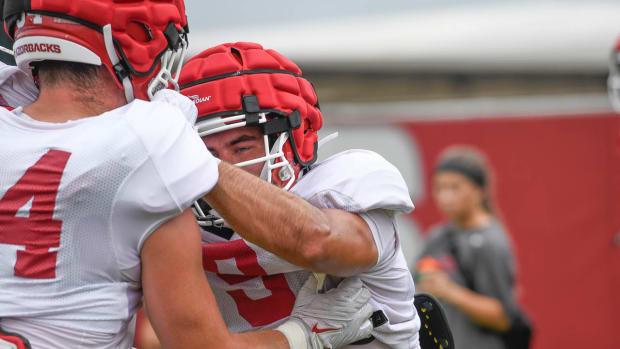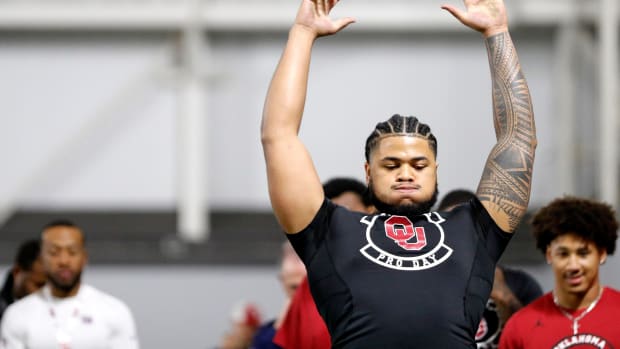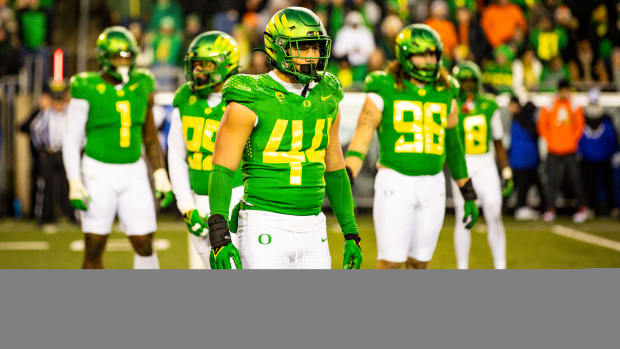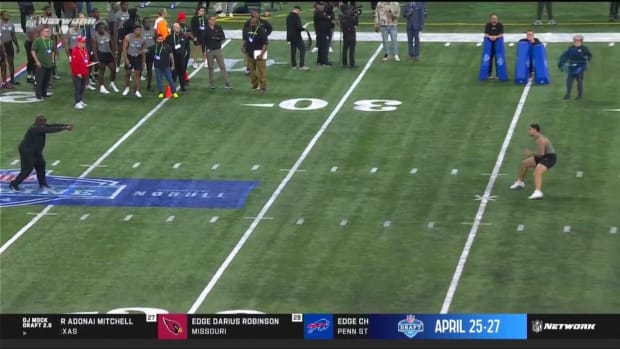Patience Is A Virtue: How David Beaty's long-term vision helped downtrodden Kansas knock off Texas
David Beaty seethed as he spoke. After his team's 19th consecutive Big 12 loss—the 16th since Beaty took over in 2015—someone else might have gone numb. But the Kansas coach doesn't do numb. He couldn't hide his emotions if he tried. So after Beaty'sJayhawks allowed their hearts to get ripped out by Iowa State in the fourth quarter on Nov. 12, Beaty gulped back tears. "That wasn't fun to watch," Beaty said of a second half in which his team gagged away a lead.
Fortunately for the Jayhawks, the losses still ached. Senior Day beckoned. Their last coach had once referred to their team as a "pile of crap." In two seasons under Beaty, the Jayhawks had won exactly one game—against an FCS team. Neither Beaty nor his team would allow the anesthesia of repeated defeat send them sleepwalking through the remainder of the season. They fought every urge to slip into a competitive coma. And that's how they wound up here on Saturday.
Most of the reaction to the Jayhawks' 24–21 overtime win against Texas has focused on the Longhorns, and rightfully so. Texas is one of college football's platinum programs, and the loss in Lawrence probably was the final straw for the Charlie Strong administration in Austin. But while Longhorns' staffers consoled one another Saturday night, the party raged in the home locker room. The Jayhawks had lost their last 23 games against FBS opponents. Now they'd taken down Texas.
Finally, Beaty had proof of concept. Instead of selling the same dream he'd sold since he arrived, he knew he could address a team on Monday that understood how sweet it felt to run off the field a winner—that understood exactly why the coaches pushed so hard even when defeat seemed inevitable. "We needed that win, because eventually you have to break through," Beaty said. "Otherwise, what are you really seeing? You say you can see it, but what the hell are you seeing? We've been close, but close don't get it in our game."
NIESEN: "Texas is back" and more predictions that we got totally wrong
That's why Beaty raged after that Iowa State loss. The Cyclones came into that game 1–8. The Jayhawks led by eight in the third quarter, but their defense couldn't get the Cyclones off the field late. On paper, it had been the best chance for a Kansas win. Would the Jayhawks have to wait another year? And if they did, could Beaty and his staff keep the team together?
Beaty knew when he took the job it would be this difficult. He chuckled Sunday night as he thought about that Iowa State team the Jayhawks faced eight days earlier. "They had four senior offensive linemen," Beaty said. "When we got here, we had four offensive linemen. I had to sign two JUCO guys to have practice. We had four freaking offensive linemen. It's unbelievable."
Nick Tre. Smith/Icon Sportswire via Getty Images
To say Charlie Weis left Kansas football in shambles is an insult to shambles everywhere. Weis had nuked the program* with a failed junior college recruiting strategy that attempted to copy the success Bill Snyder had at Kansas State without anywhere near the talent evaluation skills of Snyder or his staff. When Beaty arrived, the Jayhawks had undergone so much attrition that the NCAA's one-year signing cap kept them from reaching 85 recruited scholarship players.
Into that mess stepped Beaty, the relentlessly upbeat former Texas A&M receivers coach. He took the lowest salary in the Big 12 ($800,000 in base pay, $25,000 for each Big 12 win) and devised a plan to recruit difference-makers to a program most difference-makers wouldn't consider. "We were going to spend 80% of the time on recruiting on the 20% we can get," Beaty said. "We weren't going to do it the other way." That meant signing undersized players who projected to grow, feeding them well and hoping that projection was correct.
*While Kansas hasn't been great at football through the years, it has experienced success far more recently than most traditional power conference doormats. Remember, it was only nine years ago that Mark Mangino's Jayhawks went 12–1 and won the Orange Bowl.
Beaty and his staff ripped a page from the Gary Patterson recruiting handbook and sought long, fast, agile players. TCU's Patterson can take a high school tailback and make him an NFL defensive end, and Kansas coaches figured they had a chance if they could do something similar. For much of Saturday, the best player on the field was Kansas sophomore defensive end Dorance Armstrong. Armstrong played at North Shore High in Galena Park, Texas, but Texas and Texas A&M didn't offer. Those schools have the option to recruit high school defensive ends who are already full-sized, and the 6' 4" Armstrong weighed 212 pounds as a senior at North Shore. Armstrong now weighs 246 pounds and ranks eighth in the nation in sacks (10) and seventh in the nation in tackles for loss (17).
THAMEL: Charlie Strong's murky future at Texas shakes up the coaching carousel
Meanwhile, freshman Isaiah Bean also has cracked the defensive end rotation. The 6' 4" Bean was a 195-pound multipurpose offensive skill player until his senior year at Summer Creek High in Houston. He's now a 225-pounder, and Beaty imagines Bean and Armstrong will be a pair of similar-sized bookends next season. "We knew we weren't going to get the already 6' 4", 250-pound defensive end who is already a monster," Beaty said. "But if they'll give us time here—if they agree that they're going to do it the right way—then we'll get long, underweight guys and we'll put the weight on them."
Jayhawks coaches used the same philosophy on the offensive line. They knew quick, agile 300-pounders would have so many offers that they wouldn't consider Kansas in its current state, so they focused on tall, quick, agile 260-pounders who looked like they would gain weight. One such player was center Mesa Ribordy. Ribordy played on the line at Louisburg (Kan.) High, but as a 245-pound rising high school senior, he hit the camp circuit as a tight end and drew interest from FCS schools. Ribordy wound up walking on at Kansas last year, which certainly helped given the Weis-induced scholarship crunch. He has since earned a scholarship and grown into a 290-pound starter on the offensive line. "If they can move, you can add the weight to them and they'll still be able to move," Beaty said of the recruiting philosophy, which also drew in 265-pound freshman offensive tackle Hakeem Adeniji. "If he's 300 pounds and can't move, that guy ain't never going to move." If Ribordy's story sounds more like one from the state's other Big 12 program, that's fine with Beaty. He admires the way Kansas State coach Bill Snyder has cultivated his walk-on program through the years, and he'd like to build an equally impressive one.
Meanwhile, the Jayhawks might have found their quarterback of the future. Redshirt freshman Carter Stanley made his first career start against Iowa State, and the Jayhawks have played two of their three most competitive games in conference play with Stanley at the helm of the offense. All these factors—an improving young quarterback, high-ceiling defensive ends, agile offensive linemen who will pack on good weight as they age—offer hope for the future at a program that looked hopeless a year ago. And now that the Jayhawks have tasted victory, Beaty predicts they'll work even harder so they can taste it more often. Kansas needed a Big 12 win as proof of concept that Beaty's plan can work. Now the Jayhawks understand the feeling they've been chasing. "Why would you continue to get better if you just haven't won?" Beaty said. "I think a lot of it has to do with our coaches and the environment we've created around here. Those kids believed, and they could see it."
Instead of going numb, the Jayhawks fought through the pain. Now they understand how it feels to win, and they want to feel it again.
